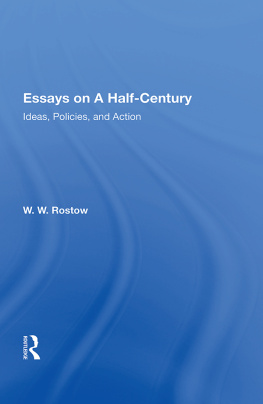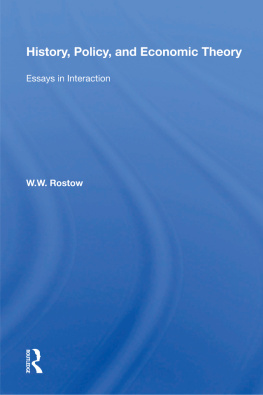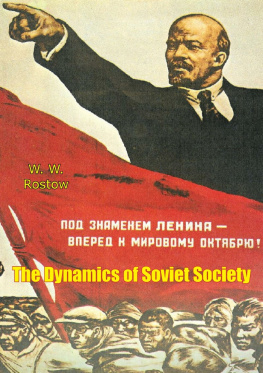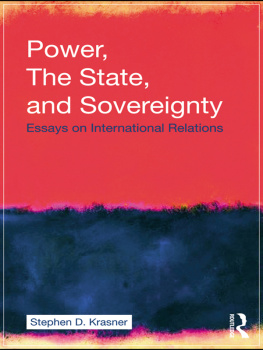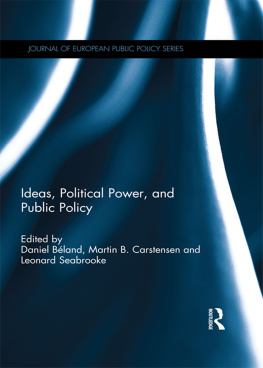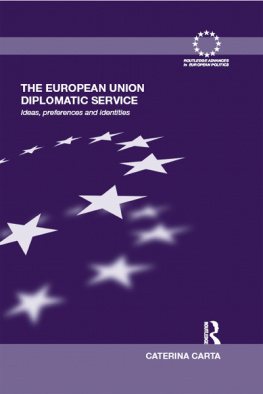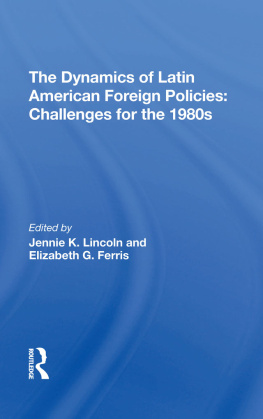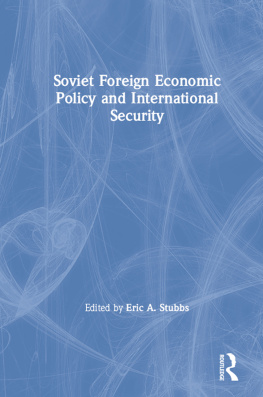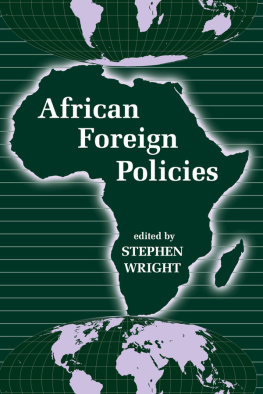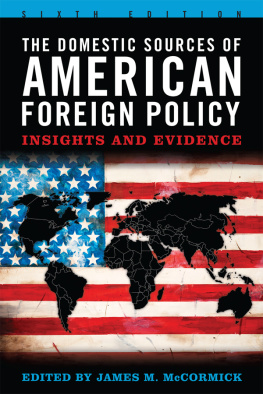Essays on a Half-Century
First published 1988 by Westview Press
Published 2018 by Routledge
52 Vanderbilt Avenue, New York, NY 10017
2 Park Square, Milton Park, Abingdon, Oxon OX14 4RN
Routledge is an imprint of the Taylor & Francis Group, an informa business
Copyright 1988 by W. W. Rostow
All rights reserved. No part of this book may be reprinted or reproduced or utilised in any form or by any electronic, mechanical, or other means, now known or hereafter invented, including photocopying and recording, or in any information storage or retrieval system, without permission in writing from the publishers.
Notice:
Product or corporate names may be trademarks or registered trademarks, and are used only for identification and explanation without intent to infringe.
Library of Congress Cataloging-in-Publication Data
Rostow, W. W. (Walt Whitman), 1916
Essays on a half-century.
1. World politics1945. I. Title.
D843.R657 1988909.8287-34647
ISBN 0-8133-0503-9
ISBN 13: 978-0-367-00689-1 (hbk)
To Elspeth
This is the second of three volumes of essays Westview Press suggested might usefully be assembled and published. The first, Rich Countries and Poor Countries , applied the perspective of history to current and foreseeable problems in the 1980s. The present volume reflects an effort, over five decades, to bring ideas to bear on major issues of domestic and foreign policy. The essays in the third volume will, for the most part, be more narrowly focused on economics and economic history. But the two facets of my workworking in academe and working in the realm of public service have tended somewhat to overlap; and this and the third volume will reflect something of that osmotic interaction.
The impulse to tidy things up and put fugitive pieces between covers is pretty strong as ones professional career winds down; and I daresay this explains in part my positive response to Westviews proposal. But there was another reason. I found early in my studies that an authors ideas are often more clearly expressed when applied to concrete circumstances, as in the pieces contained here, than when expounded abstractly. For those who may be interested in my views, this collection may, therefore, be clarifying.
The notes preceding the chapters are designed to suggest the particular setting out of which each piece arose.
My assistant and colleague of more than a quarter century, Ruby Lois Nivens, was an invaluable aide in assembling these essays, having shared since January 21, 1961, periods of intense engagement in both public and academic life. I am also indebted to Kellie Masterson, an editor at once gracious, lighthearted, and thoroughly professional.
My debt to my wife, Elspethacknowledged at the close of extends quite particularly to these occasional pieces, virtually all of which she read and greatly improved in both substance and clarity.
W. W. Rostow
Austin, Texas
One
Introduction: Notes on a Lively Half-Century
This piece has a rather parochial history . I was a member of the Yale class of 1936. We were a bumptious lot, one of whose spokesmen, in our freshman year ; proclaimed us to be Yales most distinguished class , a statement on which a Scotch verdict can, at best, be pronounced . In 1985, as our fiftieth reunion approached, I was asked, along with some others, to provide a short account of what I had been up to over the interval. The resulting essay, which follows, has been published in a volume commemorating the reunion, edited by our classmate Oliver Jensen. It is the only autobiography I plan to write.
When the thirty-two Rhodes Scholars of our year set out from New York for Southampton on the Laconia , a small ship of the Cunard line, only one, as I recall (Dwight Robinson, 36), had ever before been to Europe. The jet aircraft and the nations increased involvement in the world changed all that. It is, therefore, somehow appropriate that I write these notes on a Thai Airlines flight from Dallas-Fort Worth to Tokyo.
When I graduated from New Haven High School and started at Yale in 1932, I didnt expect to spend eleven of the next fifty-four years living and working abroad: first, as a student; then three years during the war followed by a spell in European reconstruction; a year teaching at Oxford, followed by two at Cambridge; and a Wanderjahr (1983-1984), lecturing with my wife, Elspeth, in thirty-four countries and more than 100 cities.
Looking back, I am struck by continuity rather than change and movement: My academic work runs in a straight line from a kind of black market seminar at Yale in 1933-1934 to the present. The seminar was conducted by Richard M. Bissell (32), who had just returned from a graduate year at the London School of Economics and offered to teach four of us some of the new concepts being generated there. The other participants were William Hull (34), Max Millikan (35), and Lyman Spitzer (35). We gathered in Bissels suite at Davenport College for several hours on Thursday evenings, after which we repaired to Louies for hamburgers. Bissell commanded such extraordinary gifts of exposition that Millikan defected promptly from physics to economics. I didnt defect from history but decided to combine history and economics by devoting myself to two tasks: the application of economic theory to economic history, and the study of the dynamic interaction between the economic and noneconomic dimensions of societies. Some twenty-six books and 100 or so articles later, Im still at it.
I began working on the history of the British economy but soon found that the evolution of the British economy could not be fully understood unless its story was systematically linked to the evolution of the world economy. So I shifted focus and came to study, teach, and write about the history of the world economy. This, in turn, led to the formulation of distinctive (some might say idiosyncratic) theories of economic growth and cycles. It also led in an unforced way to ideas about current policy.
By a process I do not pretend fully to understand, history, development theory, and policy came together in a highly communicable way in eight lectures I delivered on Friday mornings in Cambridge in the autumn of 1958, which turned into The Stages of Economic Growth (1960). The Stages goes on having a life of its own in every corner of the world, in virtually every language, China being the latest country of diffusion.
Like a great many of our generation, I was drawn into public service in the Second World War and have returned to it from time to time. For about a third of my professional life I have been a full-time public servant; but I have usually retained some strand of connection to public policy even when I functioned primarily as an academic.
When engaged on public policy, I did quite a lot of different things: among others, selecting bombing targets for the attack on the German air force and in support of the 1944 invasion of the Continent; working in Washington and Geneva on the reconstruction of Europe; writing drafts of Dwight D. Eisenhowers speeches in the wake of Joseph Stalins death and during the Lebanon-Jordan crisis of 1958; presiding over a committee organized by Nelson Rockefeller that generated Eisenhowers Open Skies proposal at the Geneva Summit in 1955; working with John Kennedy from February 1958, starting with his resolution with John Sherman Cooper in support of economic development aid for India; serving in Washington from January 21, 1961, to January 20, 1969, in both the White House as national security adviser and in the State Department as chairman of the Policy Planning Council.

